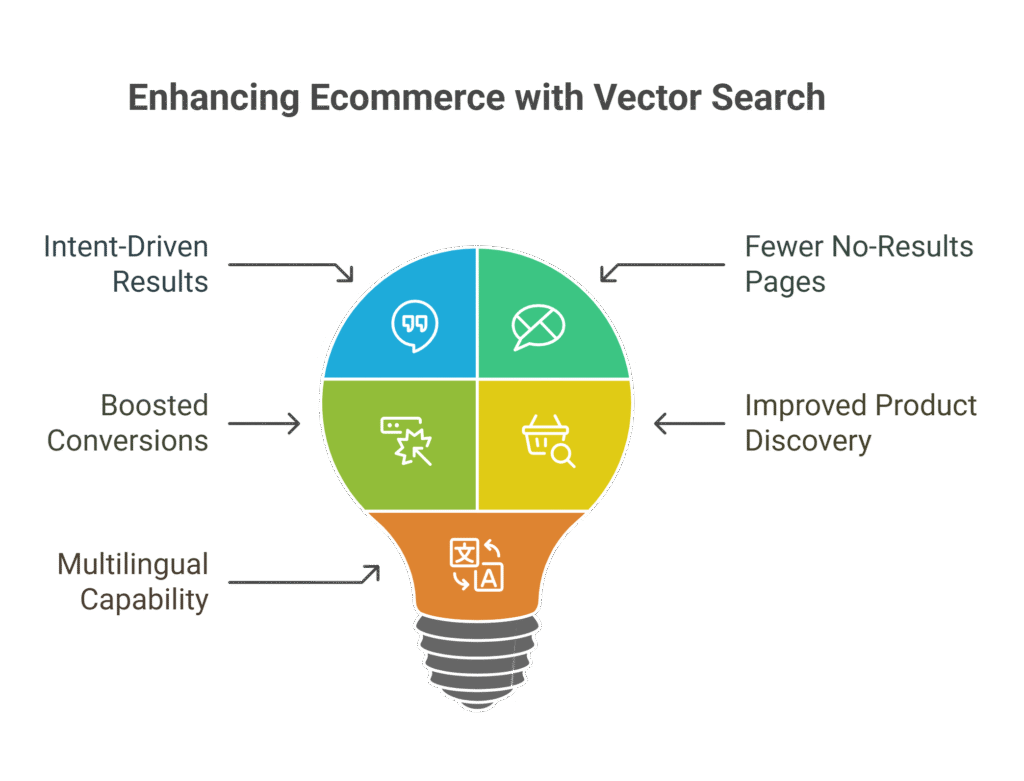Ever typed “red waterproof hiking shoes under $100” and ended up staring at umbrellas or sandals? That’s the downfall of traditional keyword-based search, it matches words, not meaning. In the world of e‑commerce, where shopper intent is everything, this creates frustration and lost sales.
Enter vector search, an advanced AI-driven solution that understands context, language, and customer intent just like a human would. Unlike conventional search engines, vector search for ecommerce delivers results based on semantic relevance, making product discovery smarter, faster, and far more intuitive.
In this blog, we’ll explain what vector search is, how it works, and why it’s transforming online shopping by turning basic search bars into intelligent recommendation engines.
What Is Vector Search?
Vector search is an AI-powered search method that represents both queries and products as high-dimensional mathematical vectors. These vectors capture semantic meaning, not just the literal words used.
Instead of matching the string “hiking boots,” vector search understands that:
- “Trail shoes” are similar
- “Outdoor footwear” is relevant
- “Red waterproof gear” includes relevant categories
The system finds results by measuring the closeness of vector representations, returning items similar in meaning even if they don’t contain the same keywords.
How It Works (in Simple Terms)
🔹 Step 1: Text to Vector
Your product data and search queries are converted into numerical vectors using models like:
- Word2Vec
- BERT
- Siamese networks
Example:
“Comfortable running shoes” → [0.241, 0.001, -0.187, ...]
This vector captures semantic information like “sportswear,” “fit,” “movement.”
🔹 Step 2: Similarity Scoring
Using cosine similarity or Euclidean distance, the system compares vectors and ranks items by relevance.
🔹 Step 3: Ranking + Feedback
Layered on top is behavior data—clicks, purchases, bounces—which continually refines the output over time.
Vector Search vs Keyword Search
| Feature | Keyword Search | Vector Search |
|---|---|---|
| Match method | Exact word/phrase | Semantic meaning |
| Handles typos | Poorly | Robust |
| Understands synonyms | Limited | Built-in via embeddings |
| Personalization | Manual tuning | Adaptive and learned from user data |
| Relevance accuracy | Surface-level | Deep contextual awareness |
Why Vector Search Matters in Ecommerce

1. Intent-Driven Results
Shoppers don’t always know the exact terms. They search like they talk:
- “Something sleek for work meetings”
- “Kid-safe indoor plants”
Vector search understands these—and returns smart results.
2. Fewer No-Results Pages
By capturing the meaning, vector systems can match even fuzzy or misspelled queries to the right items.
3. Boosted Conversions
The better the results match user intent, the faster shoppers click “buy.” This improves session duration, AOV (Average Order Value), and conversion rate.
4. Improved Product Discovery
You can now surface related products—not just ones with exact keyword overlap—leading to higher engagement and cross-sells.
5. Multilingual Capability
Vector search isn’t bound by language. One model can understand queries in multiple languages with nearly equal fluency.
E‑Commerce Use Cases of Vector Search
- Fashion: “Elegant dress for fall weddings” returns color-appropriate, seasonally styled formalwear.
- Electronics: “Laptop good for video editing” prioritizes high RAM, fast GPUs—not just any laptop.
- Home Decor: “Cozy items for winter living room” brings throws, candles, warm lighting—even without direct product tags.
- Health/Beauty: “Skin care for humid weather” matches anti-acne, non-comedogenic products without using those words.
Challenges of Vector Search in Ecommerce
It’s powerful—but not plug-and-play. Here’s what to expect:
- Data prep is crucial: Poor product descriptions = poor vectors. Clean, consistent metadata is key.
- Cold start issues: New products without traffic may need time or manual embedding.
- Cost of infrastructure: High-dimensional vector math can be compute-intensive; needs vector-optimized storage like FAISS or Pinecone.
- Explainability: Semantic matching can feel like a black box. Analytics dashboards help justify decisions.
How Expertrec Helps You Adopt Vector Search Fast
Ready to go beyond keyword matching? Expertrec brings powerful vector-based search to your e‑commerce platform—without the engineering headache.
Highlights of Expertrec :
- Pre-trained NLP models: Get started without needing your own data scientists.
- Plug-and-play vector indexing: Just connect your catalog.
- Real-time vector search + filters: Combine semantic matching with classic facets.
- Analytics dashboard: See what’s working, what’s missing, and where users drop off.
- Fast onboarding: Integrates with Shopify, Magento, BigCommerce, WooCommerce, and custom platforms.
Expertrec gives you enterprise-grade AI search capabilities with startup-grade speed and agility.
Conclusion: Turn Queries Into Conversions with Vector Search
Search is no longer about matching words—it’s about understanding people. Vector search gives your e‑commerce brand the power to interpret language, anticipate needs, and deliver relevance at every step.
Shoppers feel understood. Products become more discoverable. Sales go up.
And with Expertrec, you don’t need an AI lab to compete like Amazon. You just need the right partner.
Frequently Asked Questions
1. What makes vector search better than traditional search?
It understands meaning, not just words—resulting in more relevant and intuitive matches.
2. Can I use vector search and faceted filters together?
Absolutely. The best systems combine semantic matching with structured filtering.
3. Do I need machine learning engineers to implement vector search?
Not if you use platforms like Expertrec, which provide out-of-the-box solutions.
4. How does vector search impact SEO?
Indirectly. By improving on-site engagement, time-on-site, and product discoverability, it supports better search engine signals.
5. What’s the fastest way to test vector search on my site?
Try a solution like Expertrec, which can integrate and start showing results within days.




